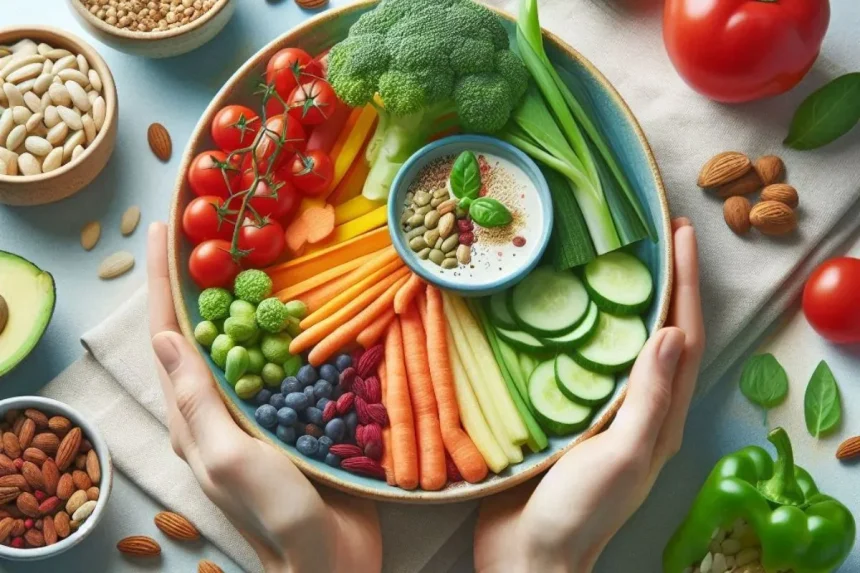Adopting a vegetarian diet can be a transformative journey towards improved health, environmental sustainability, and ethical living. The transition may seem daunting, but with the right approach and understanding, it can be a rewarding experience. This detailed guide delves into practical tips for adopting a vegetarian diet and explores the numerous benefits it offers.
Understanding Vegetarianism
Vegetarianism excludes meat, fish, and poultry but can vary based on what other animal products are included or excluded:
- Lacto-ovo vegetarian: Includes dairy and eggs.
- Lacto-vegetarian: Includes dairy but excludes eggs.
- Ovo-vegetarian: Includes eggs but excludes dairy.
- Vegan: Excludes all animal products, including dairy, eggs, and often honey.
Choosing the right type of vegetarianism depends on personal health needs, ethical beliefs, and lifestyle preferences.
Health Benefits of a Vegetarian Diet
- Nutritional Advantages: A vegetarian diet rich in fruits, vegetables, whole grains, nuts, and seeds provides essential vitamins, minerals, fiber, and antioxidants that support overall health.
- Weight Management: Vegetarians often have lower body mass indexes (BMIs) compared to non-vegetarians due to the high fiber content in plant-based foods, which promotes satiety and aids in weight management.
- Reduced Risk of Chronic Diseases: Studies show vegetarians have a lower risk of chronic illnesses like heart disease, hypertension, type 2 diabetes, and certain cancers due to the absence of red and processed meats and the presence of nutrient-rich plant foods.
- Improved Digestion: High fiber intake from plant-based foods aids in digestion and prevents constipation. A healthy gut microbiome, supported by a vegetarian diet, is crucial for overall well-being.
Environmental and Ethical Considerations
- Environmental Impact: The livestock industry is a major contributor to greenhouse gas emissions, deforestation, and water consumption. By reducing meat consumption, vegetarians help decrease their carbon footprint and promote sustainable agricultural practices.
- Animal Welfare: Many people choose vegetarianism out of concern for animal welfare, reducing the demand for factory farming, which is often associated with poor living conditions and inhumane treatment of animals.
Tips for Transitioning to a Vegetarian Diet
- Start Gradually: Transitioning to a vegetarian diet doesn’t have to happen overnight. Start by incorporating more plant-based meals into your diet and gradually reducing meat consumption.
- Educate Yourself: Understanding the nutritional aspects of a vegetarian diet is crucial. Ensure you’re getting enough protein, iron, calcium, vitamin B12, and omega-3 fatty acids. Consider consulting a nutritionist to help plan balanced meals.
- Explore New Foods: A vegetarian diet offers the opportunity to explore a variety of foods and cuisines. Experiment with different grains, legumes, vegetables, and plant-based proteins to keep your meals interesting and nutritious.
- Plan Your Meals: Meal planning is essential to ensure you’re meeting your nutritional needs. Prepare a weekly menu and include a variety of foods to get a balanced intake of nutrients.
- Stock Up on Staples: Keep your pantry stocked with vegetarian staples such as beans, lentils, tofu, tempeh, nuts, seeds, and whole grains. These ingredients can form the base of many nutritious meals.
- Find Substitutes: There are numerous plant-based substitutes for meat, dairy, and eggs available in stores. Products like almond milk, tofu, and meat alternatives can make the transition easier.
- Join a Community: Connect with other vegetarians through social media groups, forums, or local meetups. Sharing experiences, recipes, and tips can provide support and motivation.
Addressing Common Concerns
- Protein Intake: A common concern about vegetarianism is protein deficiency. However, many plant-based foods, such as beans, lentils, tofu, tempeh, nuts, seeds, and whole grains, are excellent protein sources.
- Iron Absorption: Plant-based iron (non-heme iron) is not absorbed as efficiently as animal-based iron (heme iron). Enhance iron absorption by consuming vitamin C-rich foods (like citrus fruits, bell peppers, and broccoli) alongside iron-rich plant foods.
- Vitamin B12: Vitamin B12 is primarily found in animal products. Vegetarians should consider fortified foods (such as plant-based milk and breakfast cereals) or supplements to meet their B12 needs.
- Calcium and Vitamin D: Leafy greens, fortified plant milks, and supplements can provide adequate calcium. Ensure you get enough sunlight exposure for vitamin D, or consider supplements if necessary.
- Omega-3 Fatty Acids: Flaxseeds, chia seeds, walnuts, and hemp seeds are good sources of ALA (a type of omega-3 fatty acid). Consider an algae-based omega-3 supplement if needed.
Practical Recipes and Meal Ideas
Breakfast:
Smoothie Bowls: Blend your favorite fruits with almond milk and top with nuts, seeds, and granola.
Oatmeal: Cook oats with water or plant milk and top with fresh berries, almond butter, and a drizzle of maple syrup.
Avocado Toast: Spread mashed avocado on whole-grain toast and sprinkle with nutritional yeast, salt, and pepper.
Lunch:
Quinoa Salad: Mix cooked quinoa with chickpeas, chopped vegetables, and a lemon-tahini dressing.
Lentil Soup: Simmer lentils with vegetables and spices for a hearty and warming meal.
Veggie Wraps: Fill whole-grain tortillas with hummus, spinach, roasted vegetables, and a squeeze of lemon juice.
Dinner:
Stir-Fried Tofu: Sauté tofu with a mix of your favorite vegetables and serve over brown rice.
Black Bean Tacos: Use black beans as a base and add avocado, salsa, and a squeeze of lime juice.
Eggplant Parmesan: Bread and bake eggplant slices, then layer with marinara sauce and dairy-free cheese.
Snacks:
Fresh fruit like apples, bananas, and berries.
Nuts and seeds, such as almonds, walnuts, and sunflower seeds.
Vegetable sticks with hummus.
Whole-grain crackers with guacamole or nut butter.
Conclusion
Adopting a vegetarian diet is a positive step towards better health, environmental sustainability, and ethical living. With a clear understanding of nutritional needs and careful planning, you can enjoy the numerous benefits of a plant-based diet. Start gradually, explore new foods, and seek support from the vegetarian community to ensure a successful and enjoyable transition. Embrace this journey, and you will likely find it to be both rewarding and life-enhancing.
Get more info: https://www.timelinetale.com/







